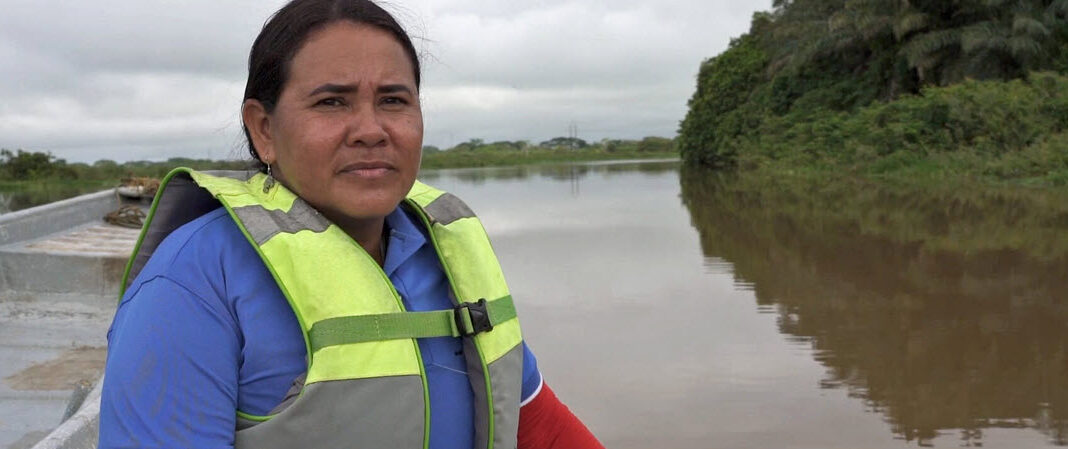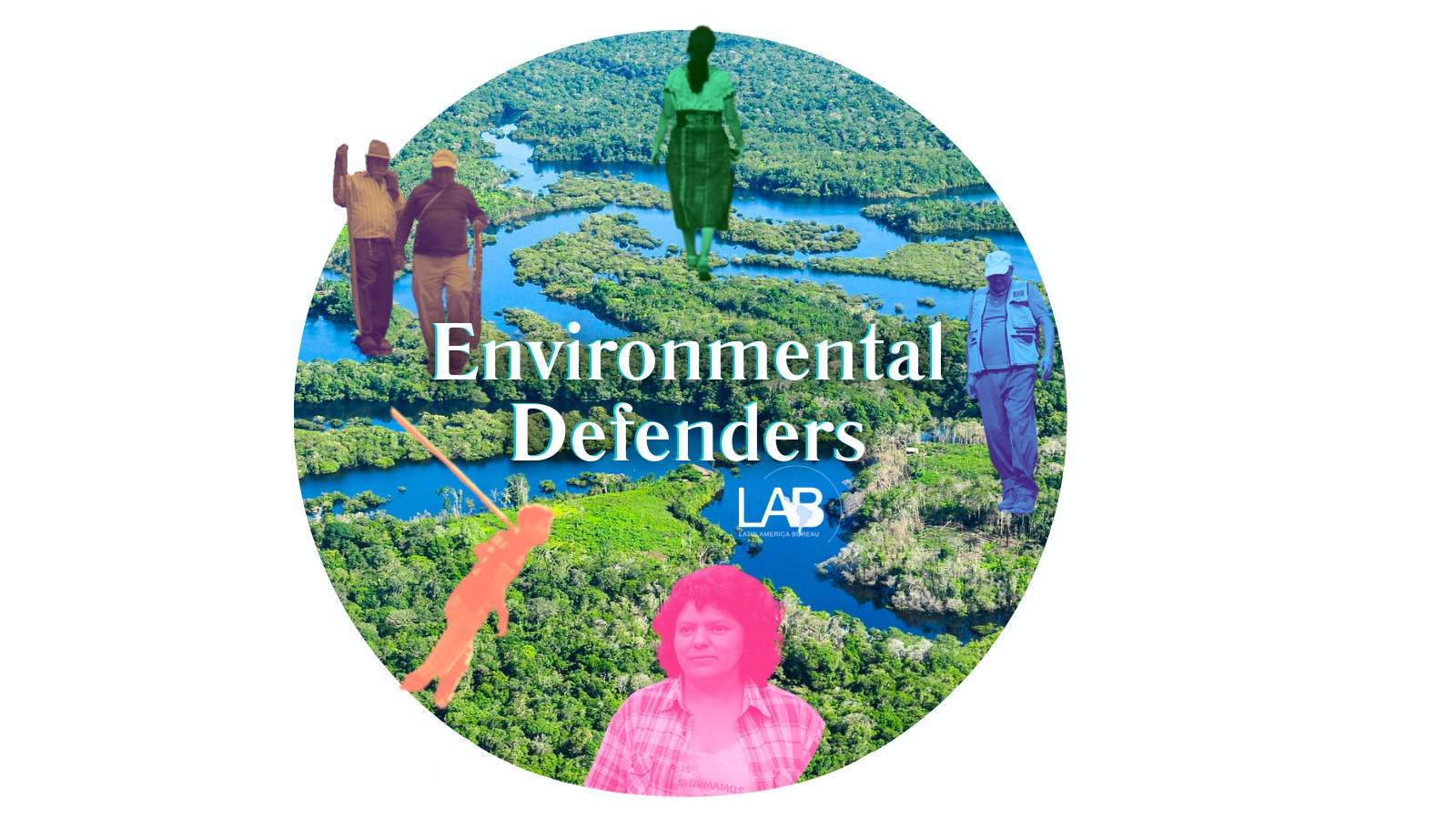- For years, Colombia’s largest oil refinery, owned by the national oil company Ecopetrol, has discharged oil and toxic waste into water bodies, impacting fish and the livelihoods of fishers.
- Yuly Velásquez, a local fisher and president of an environmental organization, has spent years documenting water contamination and corruption linked to the refinery, and she faces consistent threats and attacks.
- According to a 2022 report by the NGO Global Witness, Colombia is the most dangerous country in the world for environmental and land defenders, with 60 murders that year.
- In this interview with Mongabay, she discusses the threats environmental defenders face in Colombia and what helps her stay resilient in the face of attacks.
Yuly Velásquez grew up on the banks of the Magdalena River near the Colombian city of Barrancabermeja, an area surrounded by a large network of swamps, lagoons and tropical forests. These wetlands are home to a host of migratory fish species, such as the bocachico (Prochilodus magdalenae) and dorada (Brycon moorei), which riverside communities depend on for their livelihoods.
But in recent decades, the fish have become increasingly scarce as the city’s lucrative oil industry and a nearby landfill discharge oil and toxic waste into water bodies. The country’s largest oil refinery, owned by the national oil company Ecopetrol, is located in Barrancabermeja and contributes to 70% of the local economy, according to the latest estimates. It refines everything from gasoline to propane, and the industrial complex also hosts a large petrochemical plant to produce products derived from petrol, such as plastic. But although the refinery is a pillar in the local economy, researchers and locals say inadequate management and illegal discharge is impacting the health of residents and the livelihoods of fishers.
As a fisher and president of an environmental organization that focuses on protecting the region’s wetlands and waterways, Velásquez has faced violent threats and attacks, including three assassination attempts by unidentified aggressors. Despite efforts by her organization, FEDEPESAN (the Federation of Artisanal, Environmental and Tourist Fishermen of the Department of Santander), to monitor and report pollution and corruption in the region, Velásquez says a lot of their complaints have been ignored. Instead, attacks suffered by environmental defenders have reportedly increased.
These are the challenges Velásquez and her colleagues face on a daily basis. But her passion to protect the wetlands and guarantee access to clean water, she says, pushes her to continue her work, despite the threats to her personal safety and her family’s security.
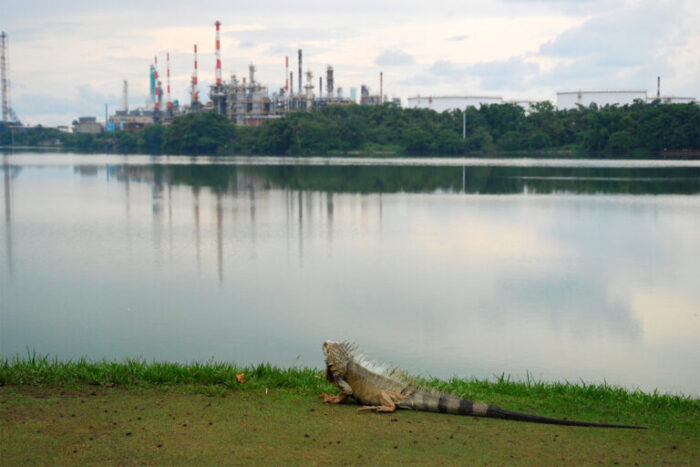
In 2022, the Colombian government announced their decision to ratify the Escazú Agreement, an international treaty adopted in 2018 that aims to protect environmental human rights defenders. Velásquez welcomes the move. However, she has expressed concern that the agreement still needs work. Since entering into force in April 2021, little progress has been made due to ratification delays and inconsistencies in its guidelines.
In an exclusive interview, Mongabay spoke with Velásquez about the threats environmental defenders face and what helps her stay resilient in the face of attacks.
This interview was edited for length and clarity.
Mongabay: Since 2020, when we last reported on oil pollution in Barrancabermeja, how has the oil industry impacted your community?
Yuly Velásquez: Among the most recent impacts in Barrancabermeja, a city in Colombia’s Santander department, is discharge from the Ecopetrol refinery in the Caño del Rosario. The Caño del Rosario was baptized by us fishers as Caño Picho (the Rotten Stream) because it is no longer a channel that is suitable for communities to use and enjoy nature. Instead, it is a channel that has been converted into toxic waste from the discharge coming from Ecopetrol’s refinery [resulting from the cleaning of its tanks]. This is affecting all the fish and the Antillean manatee [Trichechus manatus], which is on the verge of extinction. In the last two months, we rescued one, but sadly it was already dead. The birds also die. They don’t know what types of toxins are coming down this pipe. Every time they release those chemicals, all species die.
We already have a second report that we created with CREDHOS, the human rights organization that accompanies us and assists us with community monitoring. But we have not received a response from the Regional Autonomous Corporation of Santander, the competent entity that must ensure that we enjoy a healthy environment.
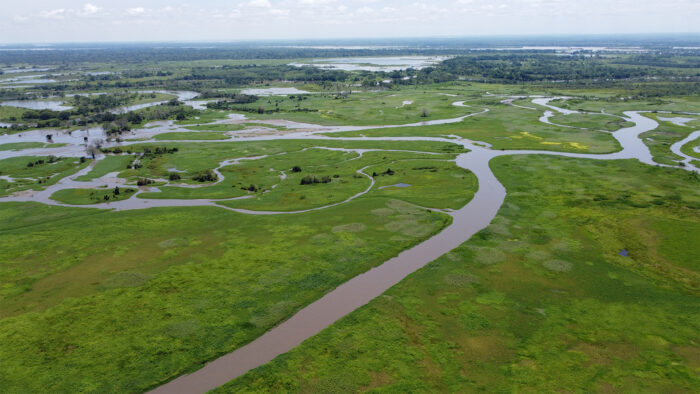
Mongabay: The refinery is a driver in the local economy. In the past, what social and economic promises drove members of your community to allow the companies to enter the region?
Yuly Velásquez: Well, many years ago, our ancestors discovered oil in Barrancabermeja. It was the Yariguí and Pipatón peoples who discovered the important oil potential that existed here in the city. Barrancabermeja is an oil city, but what the companies have done is contaminate our water sources. Progress and development cannot be above communities, directly affecting water consumption.
In many sectors, instead of water for consumption, what comes out of artisanal wells that people make manually in the ground to draw water from, is gas. You can’t call that development. We are in 2024 and there are many families near water sources who still do not have the right to an aqueduct to be able to consume and enjoy drinking water. The industry has been, therefore, practically the first economic factor that has been developed in the city and they don’t care what happens to the communities or the ecosystems in the environment because what interests them, like Ecopetrol, is to have money and to sell or market large quantities of oil. Meanwhile, the communities that depend on fishing, agriculture and other activities are directly affected.
Mongabay: According to a 2022 report by the NGO Global Witness, Colombia is the most dangerous country in the world for environmental defenders. What threats and attacks have you and your colleagues faced while carrying out your work?
Yuly Velásquez: Colombia is one of the countries where truly defending the environment means having a tombstone or a cross over you. It is having death upon us. Because here, in Colombia and in Barrancabermeja, when a human rights defender or environmentalist denounces an act and the complaint is about contamination from crude oil hydrocarbon spills or from all the contamination discharged by the refinery in the different water sources, we are stigmatized, physically, psychologically, verbally and economically.
Because when an environmentalist is defending the environment, the employment doors are closed to both them and their family.
We are frowned upon, and there are even death threats, as in my case, where three attacks have been carried out on me. I began to receive these attacks because, before, fishers never reported on this issue. We had a great leader, Luis Arango, who was assassinated a few years ago and, after that leader was assassinated, everyone was afraid to report or speak out. There is a hopelessness in observing every day how Ecopetrol and their refinery pollute our water sources and not be able to say anything.
My colleagues from FEDEPESAN have also been systematically attacked for all the complaints that we have made, because if we do not take care of the water sources, the Las Ciénegas River, which is where we fish, then we are not going to be able to fish, which we rely on to survive.
When there was the impact of the Lizama 158 oil spill [in 2018], they promised they would not pollute water sources again. But we realized that the agreement remained in the air because they continue to contaminate. Ecopetrol and its refinery say that they’ve had a good environmental reputation for the last 20, 30, 50 years, but they continue to discharge through Caño Rosario and continue to affect all species. Every day, we fishers find ourselves displaced.
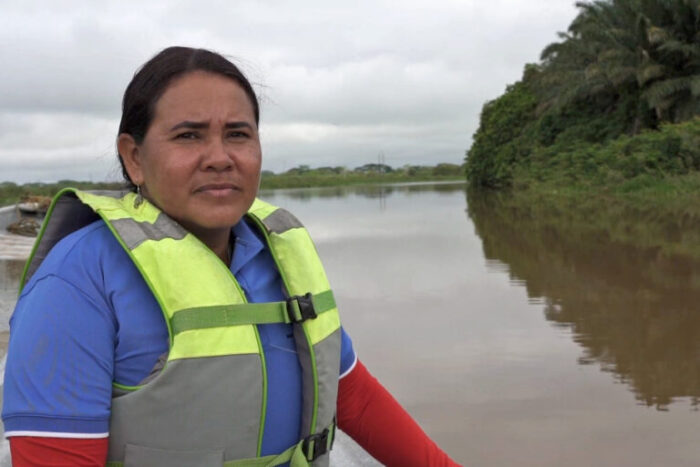
Mongabay: Can you explain precisely what attacks happened and when?
Yuly Velásquez: [Before] the fishers never denounced the acts, such as corruption in contracting — a corruption that is carried out through the Regional Autonomous Corporation of Santander CAS [the government body responsible for monitoring pollution], which in turn practically works hand in hand with Ecopetrol and its refinery. And what happens is, instead of generating development or having a good water system, contractors benefit from [a scheme] between Ecopetrol and the CAS. Ecopetrol hires contractors to clean up pollution and goes to the CAS for funds, but Ecopetrol does not invest that money into those affected or contaminated water sources. For example, a contract was presented for the Ciénega San Silvestre [San Silvestre Swamp] and, so long as Ecopetrol delivers the money, the CAS awards that contract. We already have a case with the Attorney General’s Office, regarding this act of corruption.
So, until today, 2024, we have not received a clear, concise response regarding all the evidence that the fishing communities provided before the public tender [the Prosecutor’s Office]. I had the first attack when we, with the fishers, began to publicly denounce acts of corruption that occur when Ecopetrol places this money. In that case, it was 5 billion pesos [$1.25 million]. And the Autonomous Corporation [CAS], which is the same one that must look after all the contamination events that occur in water sources in the environment, has never provided a consistent response.
And, this [pollution] led us to, firstly, organize ourselves as a small fishers’ organization. Secondly, we made the decision to form the federation, which was not the same thing as an association of 30 fishers. In a federation, there are 300 or 400 fishers facing the same problems. So, this led us to work collectively, to organize and make many more efforts to make visible the problems that arise.
What gave us the most strength was creating blockades on the main roads. By blocking a bridge, it prevented Ecopetrol from working at the different stations they had around here in Los Caños and Las Ciénegas. When making these blockades, the order was altered and Ecopetrol didn’t want their oil wells to stop. For them, what interests them is money.
Afterward, Ecopetrol officials set up working groups and visited the communities to find out what it was that we were denouncing. But they always rejected responsibility. They said this was not hydrocarbons, that this was domestic wastewater. But in several videos that we presented, we put our hands where the hydrocarbons, the crude oil, was found, and we were able to demonstrate that those black stains of oil and hydrocarbons were not domestic wastewater but were directly generated from the process they carried out at the Ecopetrol refinery. This has meant that my family has gone through a pretty serious crisis because of attacks.
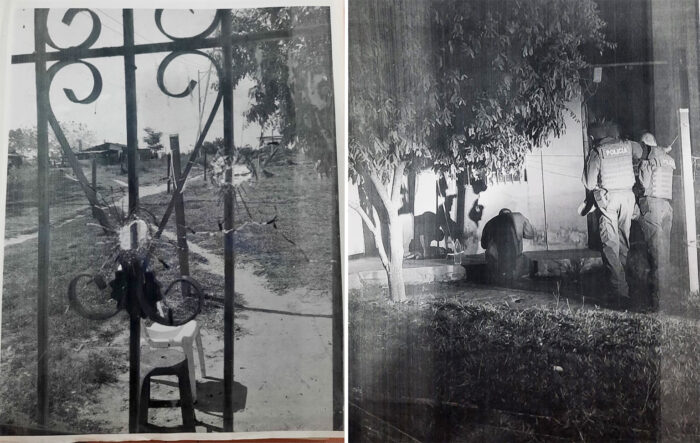
The first attack on my house was when armed men arrived; they shot at us repeatedly in the doors, in the windows, but fortunately there were no injuries. We had to leave, displaced from our first home. From there, we had to go look for a nearby police station where we could take shelter in a house because the criminals were chasing us.
A few months later, while I was with my colleagues carrying out the monitoring, which is what we can use to identify the types of pollution that occur, they also approached the boat from the shore and shot at us. We also came face to face, my bodyguard and other president leaders of the associations, at that moment with the person who was driving the boat. There were around six or seven people and we were in shock. Thank God no one was injured, fortunately. We had to leave the area and call the police to arrive.
Not even 20 days had passed since that second attack when I was in a meeting with my bodyguard and the association, and they carried out the third attack. My bodyguard was wounded [by a gunshot] in part of his face and, from the ground, he was yelling at me to run and to get away from the place because he was already injured on the floor.
Mongabay: Do you know who or which group is responsible for these attacks?
Yuly Velásquez: It has been quite difficult because the police did not deliver a clear report. They do not know who, how, why it is happening. But we do know that it is because of all the complaints that we have made visible. Thank God we don’t feel alone, because the international community is also supporting us, showing and making us visible. And this is a weapon that helps us say that we are not alone, there are other people who know the complaints that we are making and, if something were to happen to us, it is because of the complaints we made against the Ecopetrol refinery, due to all the types of pollution that occur here in the territory.
Mongabay: Environmental defenders can sometimes be seen as getting in the way of local economic or industrial development. Or as a hindrance to a better material life for the community. As an environmental defender yourself, what do you think of this?
Yuly Velásquez: It should not be like that because we fight not only for the fishers but for the entire community in general, so that those 300,000 inhabitants in Barrancabermeja can consume water in optimal conditions, which is the least that any human can have. A right to consume water and the right to be able to access water. On the other hand, greater force is needed on the part of law enforcement to carry out surveillance and guarantee security in the territories for the communities, because the communities are practically alone and vulnerable. On the other hand, since we as environmentalists are aware that the fight we are carrying out is a fight for a common good, for a collective group of communities that feel impacted, we have two options: defend the water or die defending the water. But we don’t want to die to reach that place.
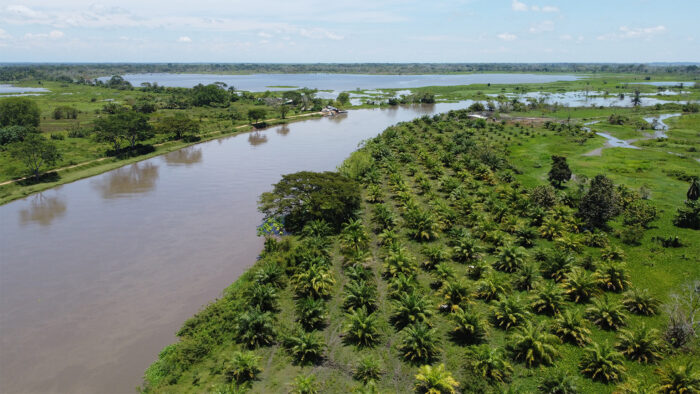
Mongabay: Has this experience made you and other members of your organization change the way you work? Has it prevented locals, like fishers, from protesting or being vocal about their opposition to these activities?
Yuly Velásquez: A little fear is always there, it is latent, but we have managed to connect with other people, other fishers. We have achieved a network in which different fishers from all over the region know us and, when they need help for any pollution situation that is occurring from the oil industry in their area, they inform us and we support them. We know that many fishers have been murdered throughout the region.
This makes us very afraid, but at the same time it also gives us strength to be able to reach every corner of the region and make visible those deaths that occur with fishers whose deaths remain unpunished, fishers who are murdered and thrown into the river or who are thrown on the banks of the canals and rivers. Their families believe that they are fishing and it turns out that they are murdered. With this network, we have managed to reach several families of fishers who suffer from this fear of these murders, of losing their loved ones.
So, we feel that we have made a little progress, with a lot of fear, because as the network becomes stronger, we are also much more visible, and so the latent fear of being attacked is greater, it is strong. That is why we accompany ourselves with CREDHOS, also with Peace Brigades International [an international NGO that works to protect human rights and environmental defenders]. They now accompany us to carry out monitoring of the pipes in Las Ciénegas. We can have a little peace of mind to be able to carry out the work.
Mongabay: And what do you think your work has achieved so far?
Yuly Velásquez: What have we achieved with the complaints we made? What we have achieved is that it somewhat mitigates those corrupt contracts that they take out frequently to legalize their exchanges. Now, they know that there is a community that is organized, that carries out oversight and is denouncing them. So, we do feel that we have achieved something strong, but we need much more. We really need that support from the national government.
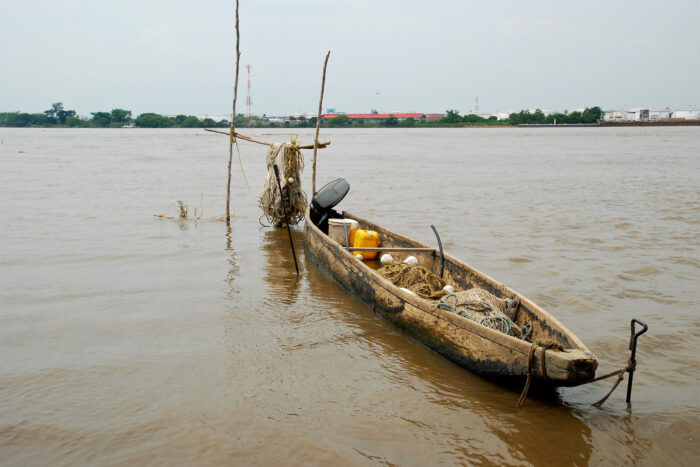
Mongabay: What would you say to other environmental defenders in similar circumstances who are afraid to keep on fighting for the wetlands, rivers and other important ecosystems?
Yuly Velásquez: The message I give to my colleagues, to all environmentalists in the world, is that we must hold on, primarily to God who guides us, and work collectively, not alone but collectively with other organizations or other colleagues to help us make visible the work we do. For us, it has been of great importance to be able to work hand in hand with other international organizations because we feel that here in Colombia, when we talk about an international organization that is supporting women leaders, we also feel respected and we are not alone. So, I invite you to try to make those contacts with the international community, that the international community supports you, does not leave you alone. Do not give up, do not give up on that fight, on that important work that we have.
Because when we do collective work, we can take that strength and reach the national government itself. We show that we’re doing work that benefits the entire community, benefits the environment. It is this fight that we do with strength, that we do not give up; on the contrary, that we hold on to the hand of God to move forward in the work we do.
Mongabay: You’ve risked a lot for this work. What reflections do you have on your career? Is there anything you would change?
Yuly Velásquez: Well, the first reflection I have is that I felt like I lost everything in the first attack they carried out against me. I felt like I lost everything because I left my home that we had built with my husband and children. With so much sacrifice, we got out of there because of that attack. They made me leave that house — I was displaced. I felt like I was losing everything because I felt like my family was breaking into pieces. But at the same time, my family knows the work I do, that it is work that is by vocation, that it is work that benefits us all.
The feeling of support from my family; my husband, my children, my mother, who told me not to give up, made me stronger. And feeling that support from them made me understand how I had to change my way of working. Previously, we arrived directly at the pollution points, but on subsequent trips we had to be more strategic and arrive to the site with other strategies. And those other strategies worked. The fact that my husband accompanies me while I’m monitoring water bodies, is always with me, that generates peace for me, that generates a sense of security for me.
Since my children have grown, they also accompany me to the field to do the work we do. They know the flora and fauna and feed the manatees. They connect with me, too, and tell me, “Mom, you have to continue doing the beautiful work you do.” My children today are proud of our work, of what we have achieved, though there have been moments where we all cry, and there have also been moments where we laugh at our experiences. So, if I could change something, I would provide a better place of security for my children.

Mongabay: What are your thoughts on the Escazú Agreement to protect environmental defenders like you? Do you think it can ever be an effective mechanism for environmental defenders in Colombia?
Yuly Velásquez: Well, that’s the dream. I think that the Escazú Agreement still needs a lot of work. But it is, let’s say, as an initiative, a hope that we environmentalists, human rights defenders and environmental defenders have. We want the Escazú agreement to be carried out, so leaders can exercise our leadership. So, we can go out to do our work, so that we can get a guarantee of our right to life, so that we can speak out without any fear. Industry, large companies and multinationals must also begin to have a sense of responsibility so that we — everyone in the community — are not affected by their actions.
We are very grateful for the entire international community, for all the colleagues who were now at the U.N. climate and biodiversity conferences providing so much information and making visible everything that is happening here. And also showing what we do as communities to mitigate climate change.
Banner image: A heron in the wetlands of Barrancabermeja. Image by Aris Gionis via Flickr (CC BY-NC 2.0).

